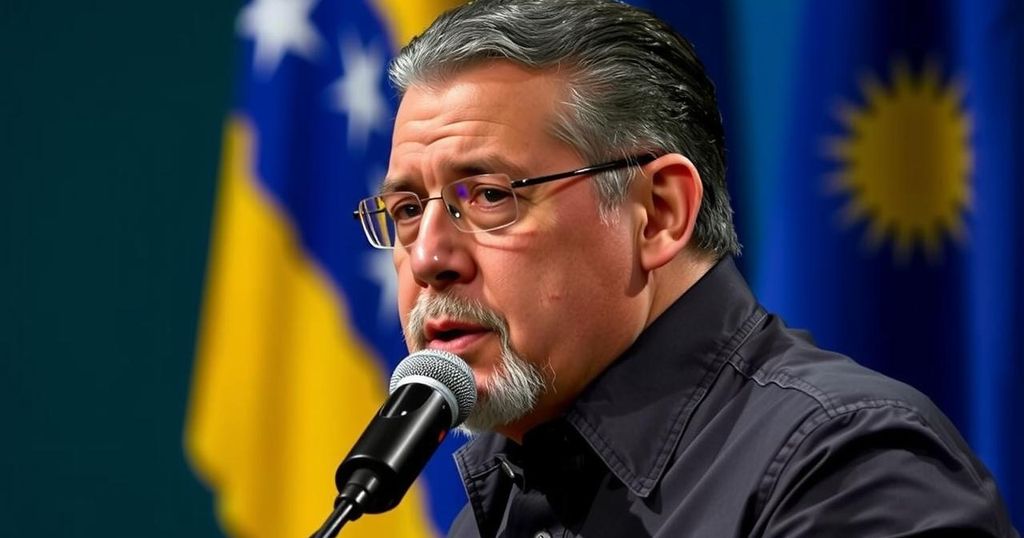Maduro Stands Defiant After Brazil’s BRICS Veto Against Venezuela
Venezuelan President Nicolas Maduro has vowed that his country will not be silenced after Brazil vetoed its application to join the BRICS group. Following the veto, which Maduro described as “hostile” and “immoral,” he asserted on state television that no one could silence Venezuela. This action follows strained relations between Maduro and Brazilian President Lula due to disputed election results. The ongoing economic crisis in Venezuela complicates its quest for international legitimacy and support.
On October 26, 2024, Venezuelan President Nicolas Maduro declared that his nation would not accept being silenced following Brazil’s decision to block its application to join the BRICS alliance, a group of emerging economies that also includes Russia, India, South Africa, and China. The Brazilian veto occurred during a summit in Kazan, Russia, an event that elicited strong condemnation from Venezuela, which characterized the action as “hostile” and “immoral.” Returning to Venezuela, Mr. Maduro expressed defiance on state television, stating, “no one will block or silence Venezuela, not today, not tomorrow, not ever,” though he refrained from directly addressing Brazil’s role in the veto. Despite being an ally of Mr. Maduro, Brazilian President Luiz Inacio Lula da Silva has faced tensions with the Venezuelan government following allegations surrounding Maduro’s contested re-election results from the July 28 ballot, results the opposition claims show he was defeated by rival Edmundo Gonzalez Urrutia. Celso Amorim, an advisor to President Lula and former Foreign Minister, remarked that the veto stemmed from a “breach of confidence” by Mr. Maduro, who had previously committed to releasing comprehensive election results. The Venezuelan opposition maintains that these results would support their claims of electoral fraud, asserting that Urrutia’s escape to Spain was precipitated by politically motivated charges against him. Furthermore, Mr. Maduro asserted that he had engaged with representatives from nearly thirty nations during the Kazan summit, all of whom acknowledged his “great electoral victory” despite the controversy surrounding the election. BRICS has been expanding, having welcomed Ethiopia, Iran, Egypt, and the United Arab Emirates in 2024, which adds to its existing member nations. The ongoing diplomatic challenges faced by Venezuela underscore its precarious position within international relations, particularly as it navigates internal economic crises exacerbated by external sanctions, predominantly from the United States.
Venezuela, currently experiencing a dire economic crisis primarily attributed by its government to U.S. sanctions, has long sought membership in the BRICS group, which comprises key emerging economies. The BRICS nations aim to provide a platform for cooperation among developing nations, and Venezuela’s inclusion could have significant implications for its international standing. Historically, the relationship between Brazil and Venezuela has been marked by complex political dynamics, especially following Maduro’s disputed electoral victory that raised questions regarding the legitimacy of his regime and its compliance with democratic norms. As BRICS continues to expand, the interplay between these nations becomes increasingly significant for regional politics and the broader global landscape.
In summary, Venezuela’s quest for BRICS membership encounters substantial obstacles following Brazil’s veto, leading to President Maduro’s emphatic declaration of resilience against perceived attempts to silence his country. The diplomatic rift signals growing tensions within the South American political landscape, particularly in light of the contested electoral outcomes under Maduro’s administration. The situation reflects broader themes of governance, confidence in electoral integrity, and international allegiance, pivotal factors amid Venezuela’s ongoing economic struggles and geopolitical aspirations.
Original Source: www.thehindu.com




Post Comment